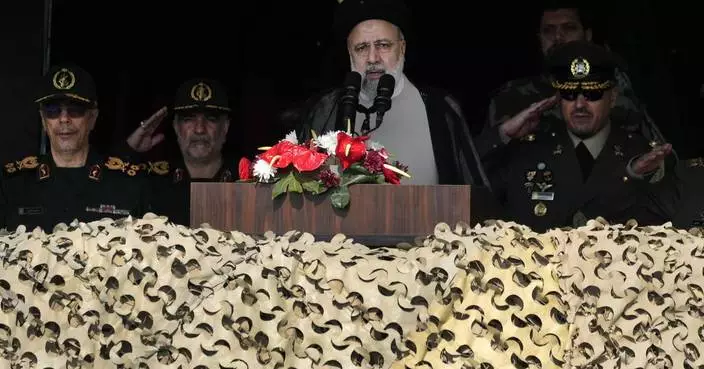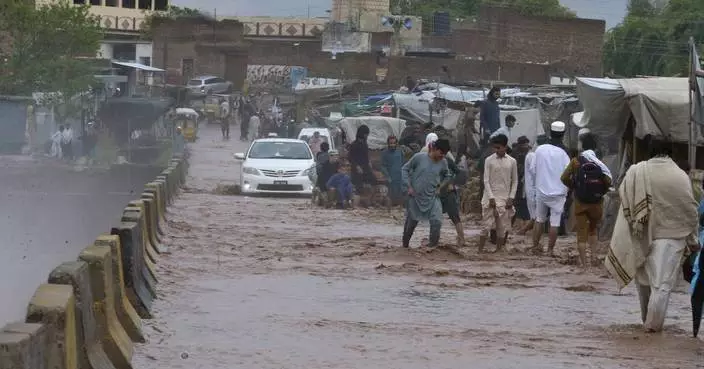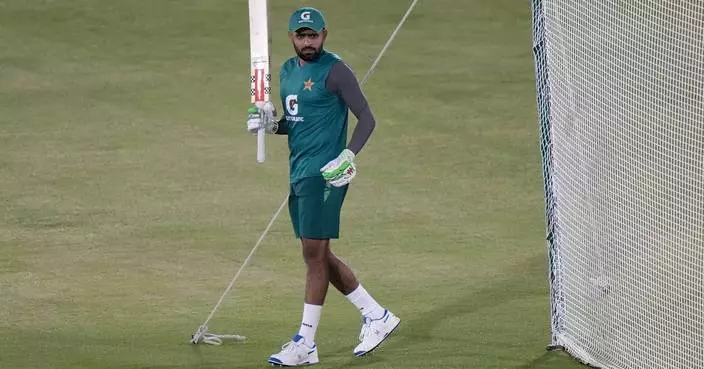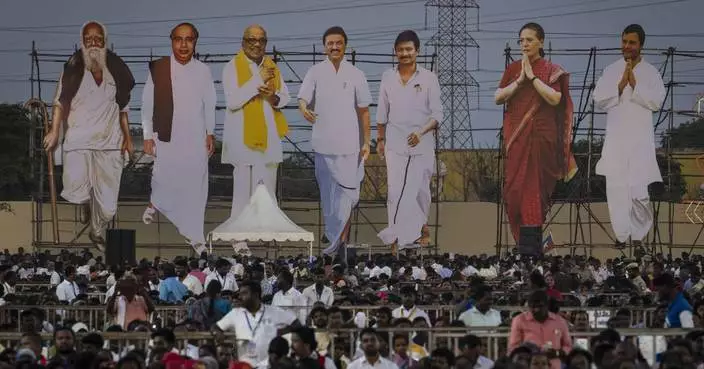Indian and Pakistani forces traded fire along the highly militarized frontier in disputed Kashmir early Wednesday after Pakistani firing killed at least four Indian paramilitary soldiers and injured three others on border patrol, Indian officials said.
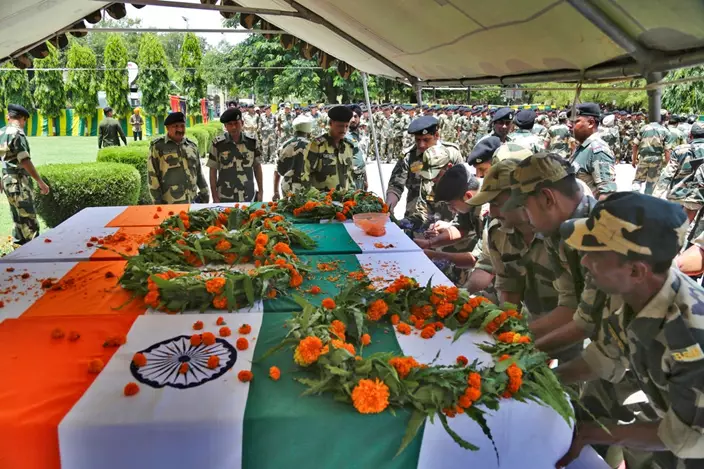
Indian Border Security Force (BSF) soldiers pay tribute to four of their colleagues who were killed early Wednesday during a wreath-laying ceremony at the BSF headquarters in Jammu, India, Wednesday, June 13, 2018. (AP Photo/Channi Anand)
Pakistan denied initiating the firing, saying its soldiers only responded to the Indian "unprovoked" fire. Islamabad also summoned an Indian diplomat to protest a civilian's killing.
Click to Gallery
Indian and Pakistani forces traded fire along the highly militarized frontier in disputed Kashmir early Wednesday after Pakistani firing killed at least four Indian paramilitary soldiers and injured three others on border patrol, Indian officials said.
Pakistan denied initiating the firing, saying its soldiers only responded to the Indian "unprovoked" fire. Islamabad also summoned an Indian diplomat to protest a civilian's killing.
Indian border guards said Pakistani soldiers first targeted a soldier around midnight by sniper fire as the Indian soldiers patrolled a border area in the Jammu region.
They said Indian soldiers retaliated, and the cross border firing stopped early Wednesday.
Pakistan summoned an Indian diplomat to protest the "unprovoked cease-fire violation" that killed a civilian. The Foreign Ministry said in a statement that the "deliberate targeting of civilian-populated areas was deplorable" and that cease-fire violations threatened peace and security.
The nuclear-armed nations had recently agreed to stop fire exchanges along the volatile frontier and uphold a cease-fire accord dating back 15 years.
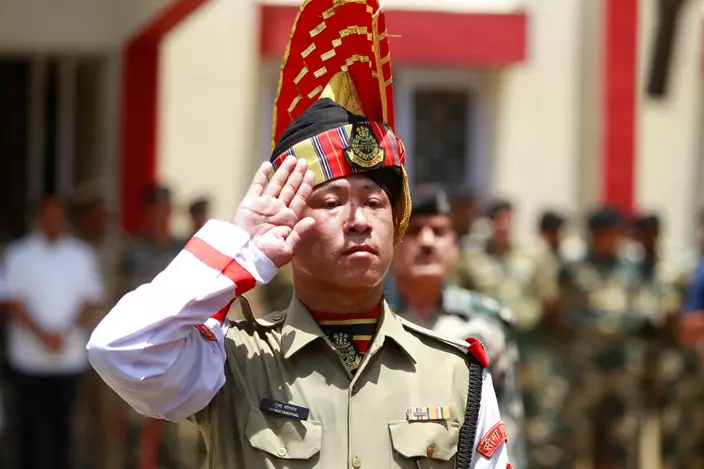
An Indian Border Security Force (BSF) soldier pays tribute to four of their colleagues who were killed early Wednesday during a wreath-laying ceremony at the BSF headquarters in Jammu, India, Wednesday, June 13, 2018. (AP Photo/Channi Anand)
Indian border guards said Pakistani soldiers first targeted a soldier around midnight by sniper fire as the Indian soldiers patrolled a border area in the Jammu region.
As other soldiers tried to rescue their fallen comrade, Pakistani soldiers opened a volley of gunfire at them, triggering further exchange, two border officials said. The two, who spoke on condition of anonymity in keeping with border guards' policy, said three soldiers were killed on the spot while the other died later while being evacuated.
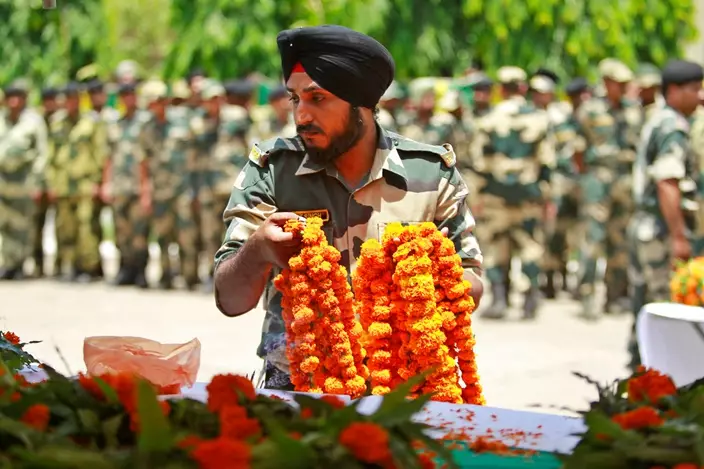
An Indian Border Security Force (BSF) soldier pays tribute to four of their colleagues who were killed early Wednesday during a wreath-laying ceremony at the BSF headquarters in Jammu, India, Wednesday, June 13, 2018. (AP Photo/Channi Anand)
They said Indian soldiers retaliated, and the cross border firing stopped early Wednesday.
In Islamabad, two security officials said Pakistani troops only returned fire after coming under unprovoked fire from the Indian border guards.
The officials said India troops also targeted a village in Pakistani-controlled Kashmir on Tuesday, killing a villager who was grazing cattle in a field near his home. The officials spoke on condition of anonymity as they were not authorized to talk to reporters.
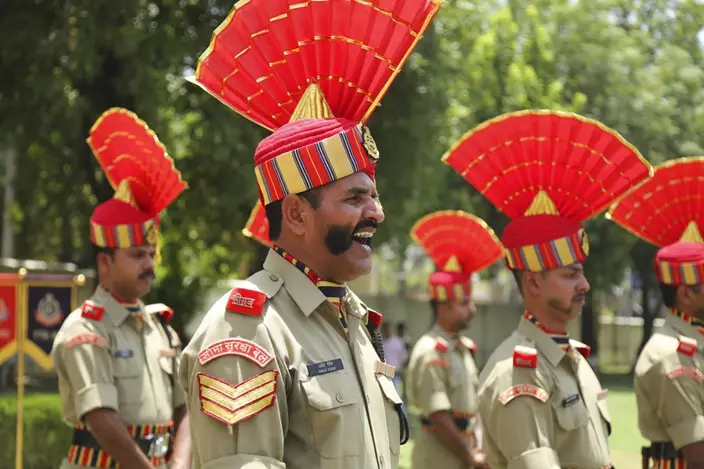
Indian Border Security Force (BSF) soldiers pay tribute to four of their colleagues who were killed early Wednesday during a wreath-laying ceremony at the BSF headquarters in Jammu, India, Wednesday, June 13, 2018. (AP Photo/Channi Anand)
Pakistan summoned an Indian diplomat to protest the "unprovoked cease-fire violation" that killed a civilian. The Foreign Ministry said in a statement that the "deliberate targeting of civilian-populated areas was deplorable" and that cease-fire violations threatened peace and security.
In May, Indian and Pakistani commanders of military operations talked by phone and agreed to defuse tensions in Kashmir. They also agreed to use existing mechanisms of hotline contacts and border flag meetings at local commanders' level to resolve the issues.
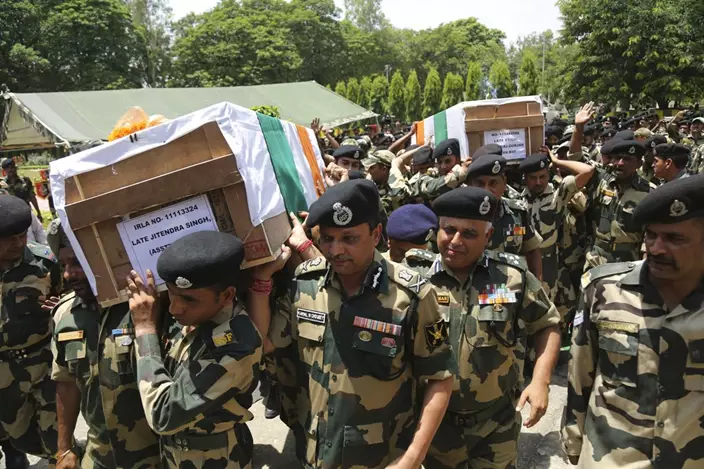
Indian Border Security Force (BSF) officers carry the coffins of four of their colleagues who were killed early Wednesday during a wreath-laying ceremony at the BSF headquarters in Jammu, India, Wednesday, June 13, 2018.(AP Photo/Channi Anand)
Early June, local border guards' commanders on the two sides met along the frontier and reiterated unsuccessfully to stop deadly hostilities.
Tensions have soared in recent months, as both sides have shelled border posts and villages, causing fatalities of soldiers and civilians on both sides. Tens of thousands of villagers have fled homes in dozens of affected villages along the frontier on both sides.
Like in the past, each side has accused the other of starting the hostilities in violation of the 2003 accord.
India and Pakistan have a long history of bitter relations over Kashmir, which both claim. They have fought two of their three wars since 1947 over their competing claims to the region.
This year, soldiers from the two nations have engaged in fierce border skirmishes along the rugged and mountainous Line of Control, as well as a lower-altitude 200-kilometer (125-mile) boundary separating Indian-controlled Kashmir and the Pakistani province of Punjab, where most of the latest fighting has taken place. This somewhat-defined portion, which India refers as "international border" and Pakistan calls "working boundary," is marked by coils of razor wire, watch towers and bunkers that snake across foothills marked by ancient villages, tangled bushes and fields of rice and corn.
The fighting has become a predictable cycle of violence as the region convulses with decades-old animosities over Kashmir, where rebel groups demand that the territory be united either under Pakistani rule or as an independent country.
NEW DELHI (AP) — Millions of Indians began voting Friday in a six-week election that's a referendum on Narendra Modi, the populist prime minister who has championed an assertive brand of Hindu nationalist politics and is seeking a rare third term as the country's leader.
The voters began queuing up at polling stations hours before they were allowed in at 7 a.m. in the first 21 states to hold votes, from the Himalayan mountains to the tropical Andaman Islands. Nearly 970 million voters — more than 10% of the world’s population — will elect 543 members to the lower house of Parliament for five years during the staggered elections that run until June 1. The votes will be counted on June 4.
This election is seen as one of the most consequential in India’s history and will test the limits of Modi's political dominance.
If Modi wins, he’ll be only the second Indian leader to retain power for a third term, after Jawaharlal Nehru, the country’s first prime minister.
Most polls predict a win for Modi and his Hindu nationalist Bharatiya Janata Party, who are up against a broad opposition alliance led by the Indian National Congress and powerful regional parties.
It's not clear who will lead India if the opposition alliance, called INDIA, wins the election. Its more than 20 parties have not put forward a candidate, saying they will choose one after the results are in.
The election comes after a decade of Modi's leadership, during which the BJP has consolidated power through a combination of Hindu-first politics and economic development.
Modi has ratcheted up Hindu nationalist rhetoric on the campaign trail, and has sought to present himself as a global leader. His ministers tout him as the steward of a surging India, while his supporters celebrate his campaign promise to make India a developed nation by 2047, when it marks 100 years of independence.
But while India’s economy is among the world’s fastest-growing, many of its people face growing economic distress. The opposition alliance is hoping to tap into this, seeking to galvanize voters on issues like high unemployment, inflation, corruption and low agricultural prices that have driven two years of farmers' protests.
Critics warn that Modi has turned increasingly illiberal and that he could use a third term to undermine India's democracy. His Hindu nationalist politics, they argue, has bred intolerance and threatens the country's secular roots.
The alliance has promised to arrest the democratic slide it says India has witnessed under Modi’s rule. They accuse Modi of sidelining elected ministers in favor of trusted bureaucrats and using tax authorities and the police to harass critics and opposition parties.
“Modi has a very authoritarian mindset. He doesn't believe in democracy. He doesn't believe in Parliamentarianism,” said Christophe Jaffrelot, who has written about Modi and the Hindu right.
Modi insists that India's commitment to democracy is unchanged. He told a Summit for Democracy meeting in New Delhi in March that '"India is not only fulfilling the aspirations of its 1.4 billion people, but is also providing hope to the world that democracy delivers and empowers.’’
The Indian leader enjoys vast popularity among India's 1.4 billion people. His BJP dominates in Hindi-speaking northern and central parts of India, and is now trying to gain a foothold in the east and south to capture a two-thirds majority. Modi and other BJP candidates have repeatedly vowed to take at least 400 seats.
The party hopes for a landslide win powered by its popular welfare programs, which it says have improved access to clean toilets, health care and cooking gas, as well as providing free grain to the poor. Moves like the construction of a controversial temple to Ram on the site of a demolished mosque, and the scrapping of the disputed Muslim-majority region of Kashmir's former autonomy, may resonate with supporters who hail him as the champion of the Hindu majority.
“Any party that comes back for a third term, and with a brute majority, is a scary prospect for democracy,” said Arati Jerath, a political commentator.
Modi's two terms have seen civil liberties in India come under attack and it implementing what critics say are discriminatory policies. Peaceful protests have been crushed with force. A once free and diverse press is threatened, violence is on the rise against the Muslim minority, and government agencies have arrested opposition politicians in alleged corruption cases.
The BJP has denied its policies are discriminatory and says its work benefits all Indians.
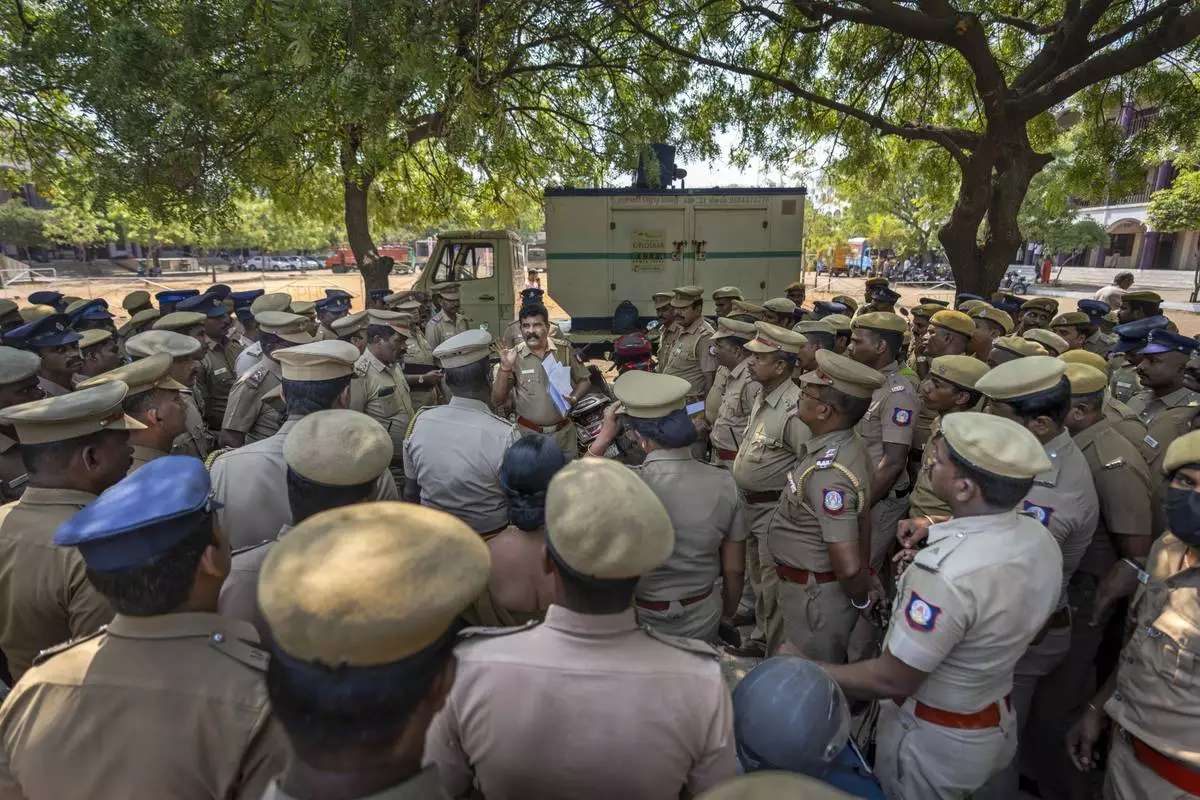
A police officer gives instructions to his colleagues at an Electronic Voting Machine (EVM) distribution venue on the eve of the first round of voting in the six-week-long national election in Chennai, India, Thursday, April 18, 2024. (AP Photo/Altaf Qadri)
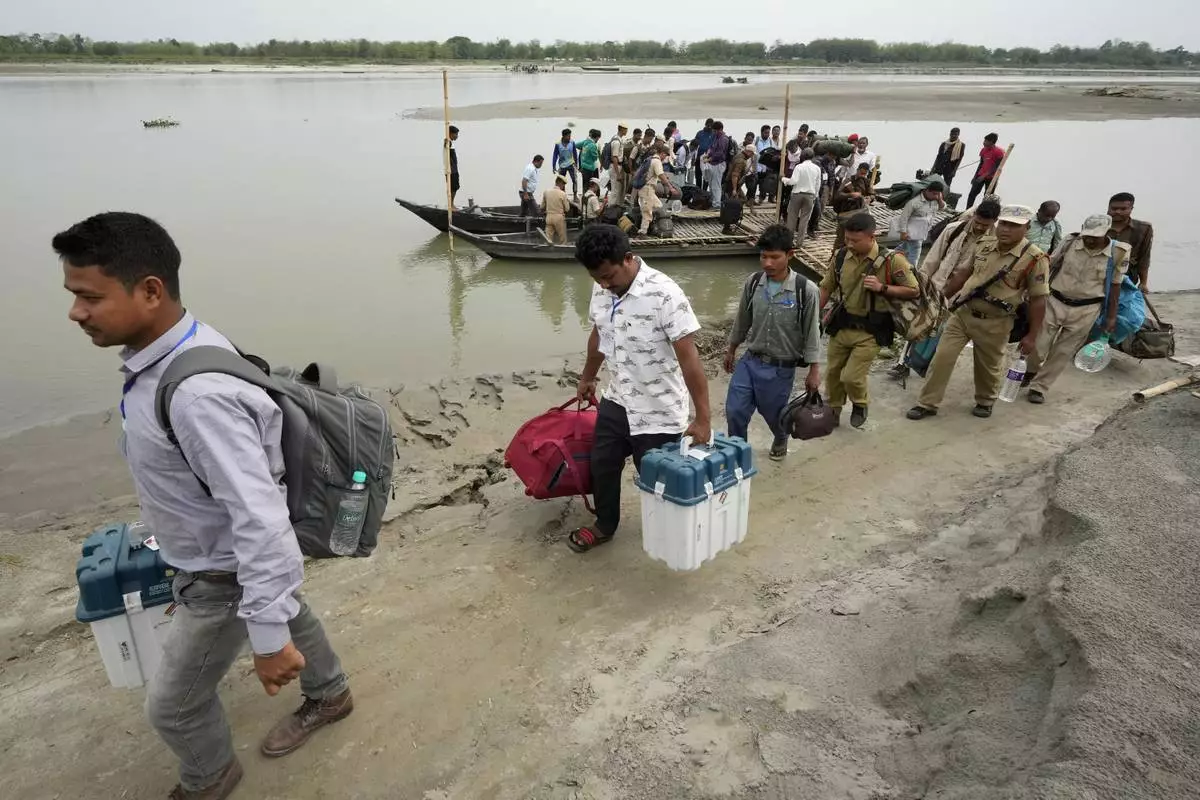
Polling officials and security personnels carry Electronic Voting Machines (EVMs) and other election material off a boat after crossing the Brahmaputra river on the eve of the national election at Baghmora Chapori (small island) of Majuli, about 350km (218 miles) east of the state capital Guwahati, India, Thursday, April 18, 2024. (AP Photo/Anupam Nath)
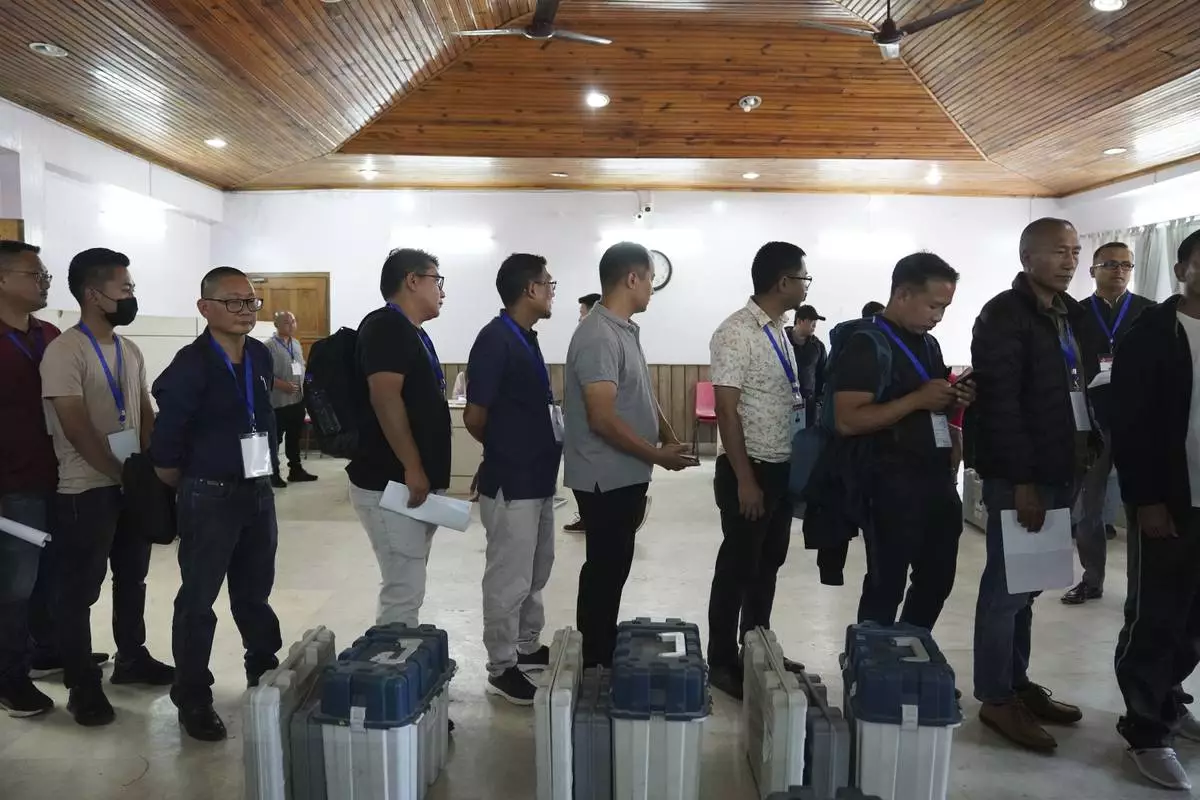
Polling officers stand in a queue to collect electronic voting machines and other election material on the eve of the first round of voting in the six-week long national election in Kohima, capital of the northeastern Indian state of Nagaland, Thursday, April 18, 2024. (AP Photo/Yirmiyan Arthur)












